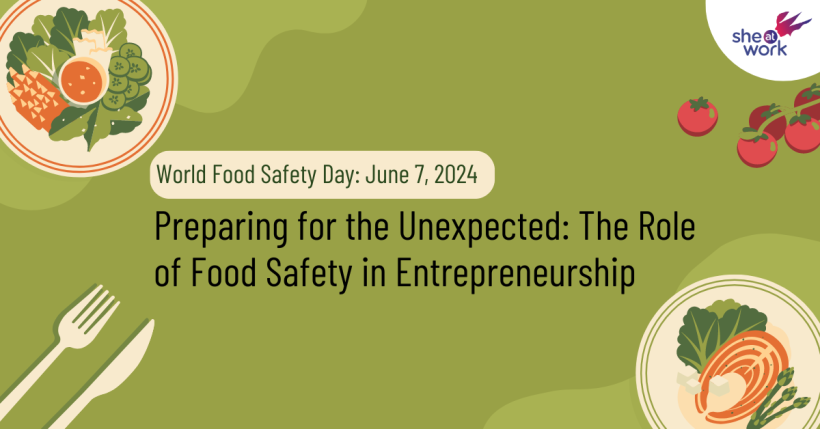#WorldFoodSafetyDay #FoodSafety #Entrepreneurship #Foodpreneurs #SafeFood #FoodIndustry #HealthAndSafety #FoodInnovation
World Food Safety Day, celebrated on June 7, 2024, brings critical attention to food safety incidents and the importance of preparedness in safeguarding our food supply.
The theme this year – “Food Safety: Prepare for the Unexpected,” underlines the necessity for proactive measures to handle potential hazards that could compromise food safety. With food safety incidents – ranging from accidental contamination to inadequate food processing controls, being ready for such events requires concerted efforts from policymakers, food safety authorities, farmers, food business operators and consumers alike.
Food safety is paramount in the business world, particularly for entrepreneurs in the food industry – ‘foodpreneurs’. These individuals (ranging from small-scale restaurateurs to large-scale food manufacturers), actually play a vital role in ensuring the food reaching consumers is safe and free from harmful contaminants. The failure to implement robust food safety protocols can lead to severe consequences, including product recalls, financial losses, and damage to brand reputation.
World Food Safety Day is indeed, a crucial reminder for ‘foodpreneurs’.
Entrepreneurship in the food sector has been gaining traction, especially among the younger generation. Aspiring ‘foodpreneurs’ must not overlook the critical aspect of food safety in their business plans, for it can lead to severe repercussions, as food safety is not just about compliance but about safeguarding public health. For a food business to thrive, it must incorporate stringent food safety measures right from the start.
Essential Food Safety Prerequisites for Aspiring ‘Foodpreneurs’
- Get Necessary Certification & Licenses: Obtaining food safety certifications
must be prioritized – to demonstrate commitment to maintaining high food safety
standards. Proper training on food safety protocols is essential, and obtaining necessary licenses and passing government inspections ensure that the business is legally compliant and safe for consumers.
- Create a Food Safety Manual: A comprehensive manual serves as a critical reference for all employees; and it should detail every aspect of food safety – from purchasing and receiving to storage, preparation, cooking & serving.
- Train Your People & Create a Culture of Food Safety: Every team member must be trained in food safety practices. Creating a culture of food safety within the business ensures that all employees understand the importance of maintaining high food safety standards and consistently apply them in their daily tasks.
- Structure Your Facility in Compliance with Food Safety Standards: The setup of this facility should support the implementation of food safety protocols. Using food-grade materials, stainless steel surfaces, and certified equipment helps maintain hygiene and prevent contamination. Ensuring that the facility’s design adheres to Good Manufacturing Practice (GMP) standards is critical.
- Create a Food Safety Plan for Each Menu Item: Developing a Hazard Analysis Critical Control Point (HACCP) plan for each menu item helps identify potential food safety hazards & outlines measures to control or eliminate them. This plan ensures that all food served is safe for consumption.
- Create a Risk Management Team: Despite the best efforts, food safety programmes can occasionally fail. Having a risk management team in place ensures that there is a structured plan – to handle foodborne illnesses or other food safety failures.
So, as we observe World Food Safety Day, it’s a timely reminder for ‘foodpreneurs’ to place food safety at the forefront of their business strategies. By adopting robust food safety measures, entrepreneurs not only protect their customers but also enhance their business’s credibility and sustainability.










